Ginisang Munggo at Chicharon was our Friday ritual, a tradition my mother faithfully kept because of the Catholic practice of abstaining from meat on Fridays. But we never felt like we were missing out!
The way my mom transformed these humble mung beans into a creamy, flavorful stew was pure magic. While technically, it's a vegetable dish (our elders would always remind us), she'd add crispy chicharon that would slowly render its rich flavor into the broth, making every spoonful absolutely irresistible.
Whenever I make this dish in my own kitchen, the familiar aroma instantly takes me back to those Fridays, watching mom expertly balance the patis and lovingly wilt the fresh spinach at just the right moment.
This family ginisang munggo at chicharon recipe has carried me through countless rainy days and busy weeknights, and I'm excited to share our version of this Filipino comfort food classic with you.
Jump to:
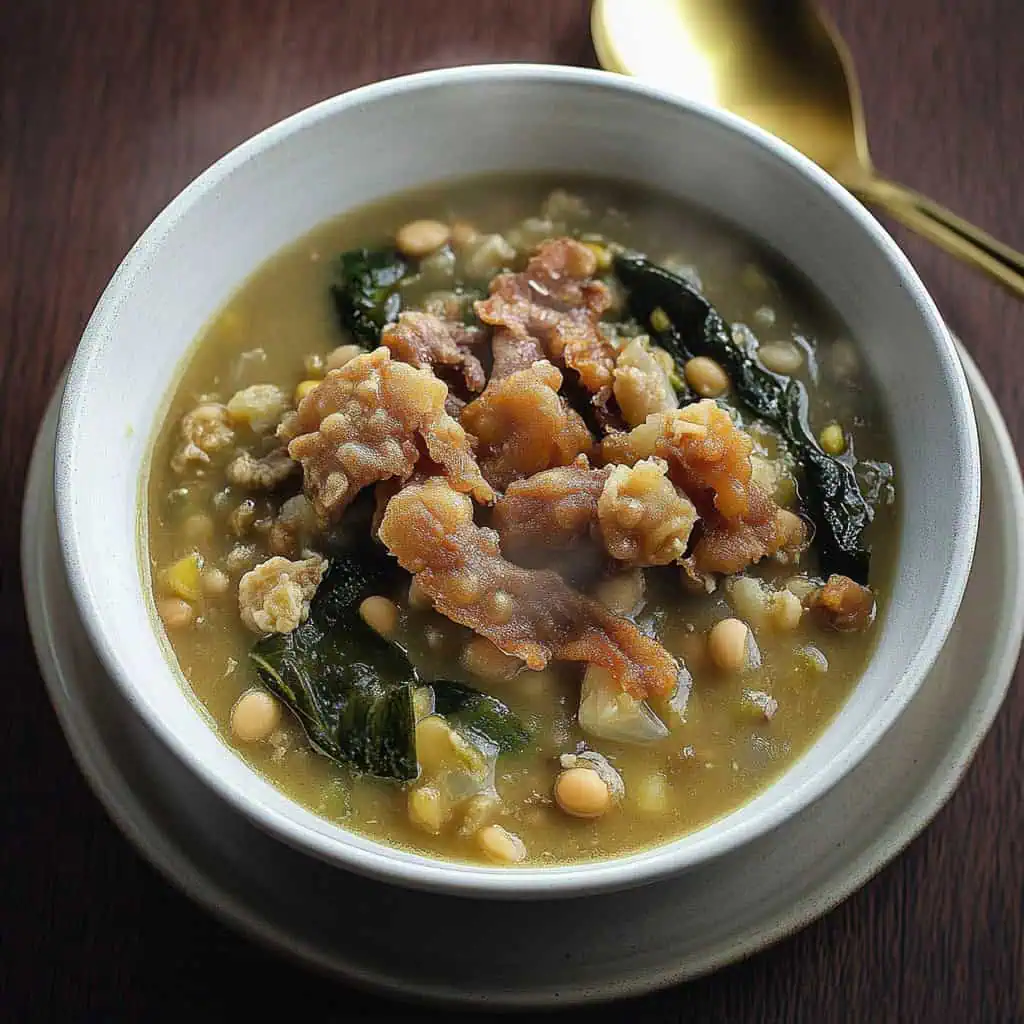
Why You'll Love This Recipe
- Budget-friendly yet incredibly satisfying
- Perfect balance of textures - creamy beans, crispy pork, tender greens
- One-pot meal ready in under 90 minutes
- Packed with protein and fiber
- Authentic Filipino flavors passed down through generations
- Versatile recipe that can be customized to your taste
Ingredients
Each ingredient in this recipe serves a crucial purpose: mung beans provide hearty protein and fiber; chicharon adds rich flavor and satisfying crunch; aromatics (garlic, onion, tomato) create a flavorful base; fish sauce delivers umami depth; and fresh spinach brings color, nutrients, and lightness to balance the rich stew.
Together, these ingredients create a perfect harmony of textures and flavors – creamy, crunchy, savory and fresh – making this humble dish extraordinarily satisfying with minimal ingredients.

- 1 cup dried mung beans (monggo)
- 6 cups water
- 1 tablespoon vegetable oil
- 1 medium onion, peeled and finely chopped
- 3 cloves garlic, minced
- 1 large tomato, diced
- 2 cups chicharon with meat (pork cracklings)
- 1 bunch fresh spinach
- 1 tablespoon fish sauce (patis)
- Salt and pepper to taste
Equipment
- Large heavy-bottomed pot (kaldero) - For even cooking and preventing beans from sticking to the bottom
- Wooden spoon (sandok) - For gentle stirring without breaking the beans
- Fine-mesh strainer - For thoroughly washing mung beans before cooking
- Sharp knife and cutting board - For preparing vegetables and other ingredients
- Measuring cups and spoons - For precise measurements of ingredients
- Spider strainer - For skimming foam that rises during bean cooking

How To Make
- Sort and clean beans: Sort through mung beans, removing any stones or damaged beans. Rinse thoroughly until water runs clear using room temperature water for cleaning.
- Cook the mung beans: In a large pot, combine cleaned mung beans and 6 cups of water. Bring to a boil over medium-high heat. Once boiling, reduce heat to low-medium and simmer covered for 45-50 minutes until beans are tender. Maintain approximately 4 cups of liquid throughout cooking.
- Prepare the aromatics: Heat vegetable oil in a pot over medium heat. Sauté minced garlic until light golden, about 30 seconds. Add chopped onions and cook until translucent, about 3-4 minutes. Add diced tomatoes and cook until softened, about 5 minutes.
- Combine and simmer: Add the cooked beans with their liquid to the pot with sautéed vegetables. Stir in fish sauce and chicharon. Let the mixture simmer for 10-15 minutes until the chicharon softens and releases its flavors into the broth.
- Add greens and rest: Add fresh spinach, cover the pot, and remove from heat. Let stand for 2 minutes until the greens wilt. Allow the dish to rest for 5 minutes before serving to let the flavors meld together.

Tips from Lola's Kitchen
- Reserve some crunch: Save a handful of crispy chicharon for garnishing each bowl for textural contrast.
- Secret flavor booster: Try adding a tablespoon of dried shrimp (hibe) along with the aromatics for deeper umami notes.
- Bean texture mastery: Cook the beans until they're very tender and starting to break down slightly—this creates the creamy texture that makes great munggo.
- Liquid management: Add water gradually rather than all at once to achieve your perfect consistency. Remember that the stew will thicken as it cools.
- Fresh is best: Whenever possible, use fresh tomatoes rather than paste for a brighter, more authentic flavor profile.
- Patience pays off: After cooking, let the dish rest off the heat for 5-10 minutes. This allows flavors to fully develop and integrate.
- Temperature matters: Serve munggo piping hot for the best flavor experience.
Substitutions
- Greens: Replace spinach with malunggay (moringa) leaves, ampalaya (bitter melon) leaves, or water spinach (kangkong).
- Protein: Substitute chicharon with lechon kawali chunks, crispy bacon, or smoked fish (tinapa) for different flavor profiles.
- Fish sauce: If unavailable, use sea salt adjusted to taste, though you'll lose some of the distinct umami.
- Tomatoes: In a pinch, substitute fresh tomatoes with 2 tablespoons of tomato paste mixed with a little water.
- Oil: Use coconut oil instead of vegetable oil for a more traditional Filipino flavor profile.
- Aromatics: If short on fresh garlic, substitute with 1 teaspoon of granulated garlic.
Troubleshooting
- Too thick? Add hot water gradually while stirring until you reach desired consistency. Always add hot rather than cold water to maintain temperature.
- Beans still hard after cooking time? Continue cooking and add more hot water as needed. Older beans take longer to soften. A pinch of baking soda can help stubborn beans soften faster.
- Too salty? Add more vegetables or a small, peeled potato chunk to absorb excess salt. Remove the potato before serving.
- Flavors seem bland? Adjust fish sauce and black pepper to taste. A squeeze of calamansi or lime juice right before serving can brighten all flavors.
- Chicharon didn't soften enough? Crush it slightly before adding and ensure it simmers long enough to release flavor and soften.
- Foam appearing while cooking beans? This is normal—just skim it off with a spoon or spider strainer for a clearer broth.
Storage & Reheating
- Refrigeration: Store in an airtight container for up to 3 days. The flavor actually improves overnight as ingredients continue to meld.
- Freezing: Freeze for up to 1 month without the spinach (add fresh greens when reheating). Cool completely before transferring to freezer-safe containers.
- Reheating: Warm on stovetop over medium heat, stirring occasionally. Add water as needed to reach original consistency as the stew thickens considerably when cold.
- Refreshing: When reheating, add a small splash of fish sauce to revitalize flavors that may have dulled during storage.
- Adding greens: If you stored without greens, add fresh spinach during the last minute of reheating for optimal color and nutrition.

FAQ
Do I need to soak the mung beans overnight?
No, unlike many other beans, mung beans cook relatively quickly without pre-soaking. However, if you want to reduce cooking time, you can soak them for 1-2 hours.
Can I make this dish in advance for a party?
Absolutely! In fact, the flavors improve overnight as they meld together. Simply reheat gently and add fresh greens just before serving.
Is this dish freezer-friendly?
Yes, freeze without the greens for up to 1 month. Thaw overnight in the refrigerator and reheat on the stovetop, adding fresh greens toward the end.
How can I make this dish healthier?
Reduce the amount of chicharon, increase the vegetables (add carrots, squash, or more greens), and use less salt/fish sauce. You can also use lean pork instead of chicharon.
Can I use canned mung beans to save time?
Yes, drained canned mung beans work well in this recipe. Reduce the initial cooking time accordingly and add them when combining with the sautéed vegetables.
What's the best way to serve Ginisang Munggo?
Traditionally, it's served hot with steamed white rice. Many Filipinos also enjoy a side of fried fish or a squeeze of calamansi lime for brightness.
Can I make this in a slow cooker or pressure cooker?
Yes! For slow cooker: 6-8 hours on low. For pressure cooker or Instant Pot: 10-12 minutes at high pressure with natural release. Add the greens after cooking.
Is there a vegetarian version?
Absolutely! Omit the chicharon and use mushrooms sautéed in a bit of soy sauce and oil for umami. Use vegetable broth instead of water and sea salt instead of fish sauce.
Related
Looking for other recipes like this? Try these:

Ginisang Munggo at Chicharon (Filipino Mung Bean Stew with Pork Cracklings)
Equipment
- Large heavy-bottomed pot (kaldero) For even cooking and preventing beans from sticking
- Wooden spoon (sandok) For gentle stirring without breaking the beans
- Fine-mesh strainer For washing mung beans
- Sharp knife and cutting board For prep work
- Measuring cups and spoons (Panukat) For precise measurements
- Spider strainer For skimming foam
Ingredients
- 1 cup dried mung beans monggo
- 6 cups water
- 1 tablespoon vegetable oil
- 1 medium onion peeled and finely chopped (sibuyas)
- 3 cloves garlic minced (bawang)
- 1 large tomato diced (kamatis)
- 2 cups chicharon with meat pork cracklings
- 1 bunch fresh spinach espinaka or malunggay leaves
- 1 tablespoon fish sauce patis
- Salt and pepper to taste
Instructions
- Sort through mung beans (monggo), removing any stones or damaged beans. Rinse thoroughly until water runs clear using room temperature water (27°C/80°F) for cleaning.
- In a large pot, combine cleaned mung beans and 6 cups of water. Bring to a boil over medium-high heat (100°C/212°F). Once boiling, reduce heat to low-medium (80°C/175°F) and simmer covered for 45-50 minutes until beans are tender. Maintain approximately 4 cups of liquid throughout cooking.
- Heat vegetable oil in a pot over medium heat (160°C/320°F). Sauté minced garlic (bawang) until light golden, about 30 seconds. Add chopped onions (sibuyas) and cook until translucent, about 3-4 minutes. Add diced tomatoes (kamatis) and cook until softened, about 5 minutes.
- Add the cooked beans with their liquid to the pot with sautéed vegetables. Stir in fish sauce (patis) and chicharon. Let the mixture simmer for 10-15 minutes until the chicharon softens and releases its flavors into the broth.
- Add fresh spinach, cover the pot, and remove from heat. Let stand for 2 minutes until the greens wilt. Allow the dish to rest for 5 minutes before serving to let the flavors meld together.
- For best results when reheating, warm over medium heat (160°C/320°F), adding water as needed to adjust consistency. The dish can be refrigerated for up to 3 days in an airtight container.
Tips from Lola's Kitchen
- Save some crispy chicharon for garnish
- For extra flavor, add dried shrimp
- Cook beans until very tender but not mushy
- Add water gradually to achieve desired consistency
- Use fresh tomatoes for better flavor
- Let dish rest 5 minutes before serving for flavors to meld
Nutrition
The Story Behind Ginisang Munggo at Chicharon
Ginisang Munggo at Chicharon represents the ingenuity of Filipino home cooking, where humble ingredients transform into extraordinary comfort food. Mung beans, originally from India and Southeast Asia, became deeply integrated into Filipino cuisine during centuries of trade and cultural exchange. These protein-rich legumes found their way into countless Filipino households as an affordable, nutritious staple that could feed large families on a modest budget.
The addition of chicharon (crispy pork cracklings) to munggo is a distinctly Filipino innovation that showcases our culture's resourcefulness. While the dish started as a simple bean stew often served during Catholic Lent - particularly on Fridays as a meat-free option - home cooks discovered that adding leftover chicharon or lechon kawali created an incredibly flavorful variation. The crispy pork gradually softens in the broth, releasing its rich flavors while adding a delightful textural contrast to the creamy beans.
Today, Ginisang Munggo at Chicharon remains a beloved fixture in both Filipino homes and carinderias (local eateries). You'll find it served everywhere from humble neighborhood eateries to modern Filipino restaurants, each adding their own twist while maintaining the dish's comforting essence. It's particularly popular during the rainy season, when a steaming bowl of munggo provides warmth and satisfaction. The dish exemplifies the Filipino talent for elevating simple ingredients through thoughtful preparation and creative combinations.
In many Filipino households, this dish is traditionally prepared on Fridays - a practice that began with the Catholic tradition of meat abstinence but evolved to include variations with pork, shrimp, or fish. This weekly ritual has helped preserve munggo's place in Filipino culinary heritage, making it one of the most recognized and cherished Filipino vegetable dishes, even with its modern meat-enhanced variations.
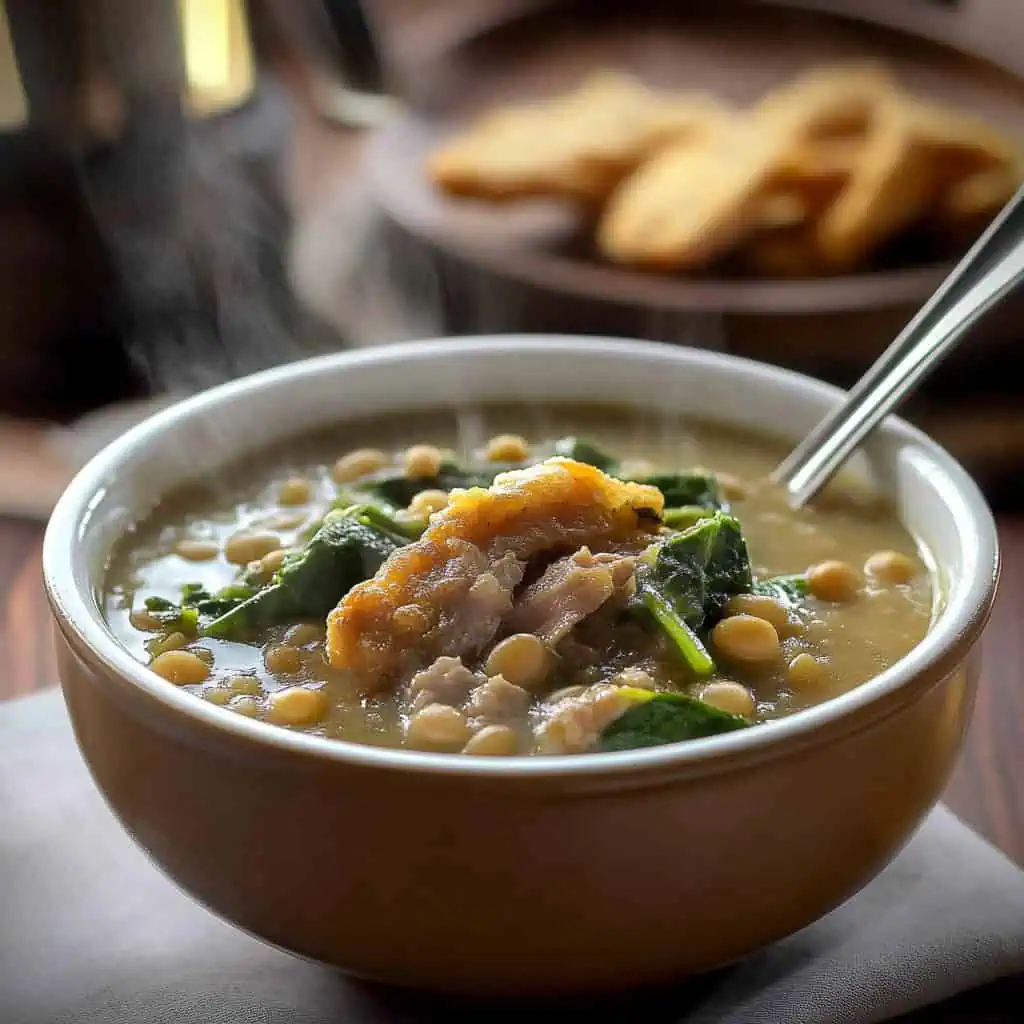

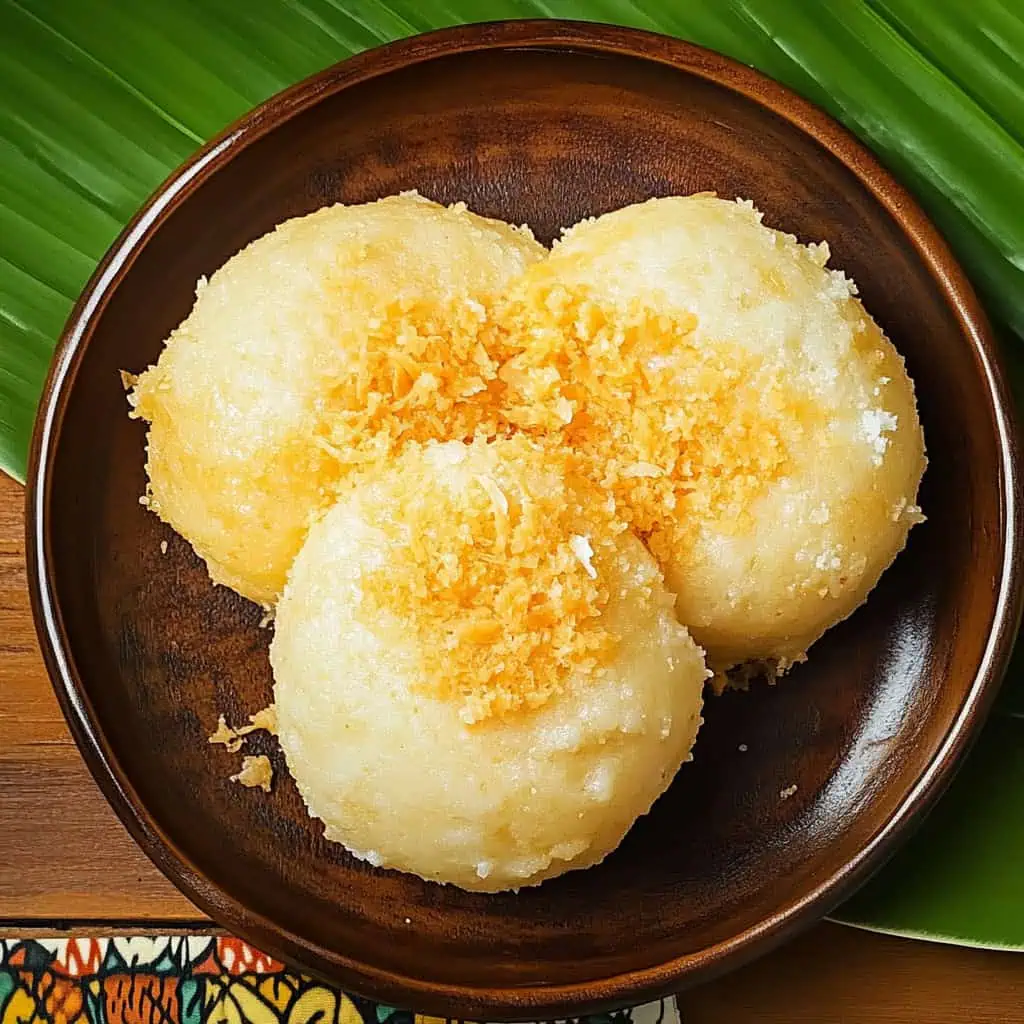
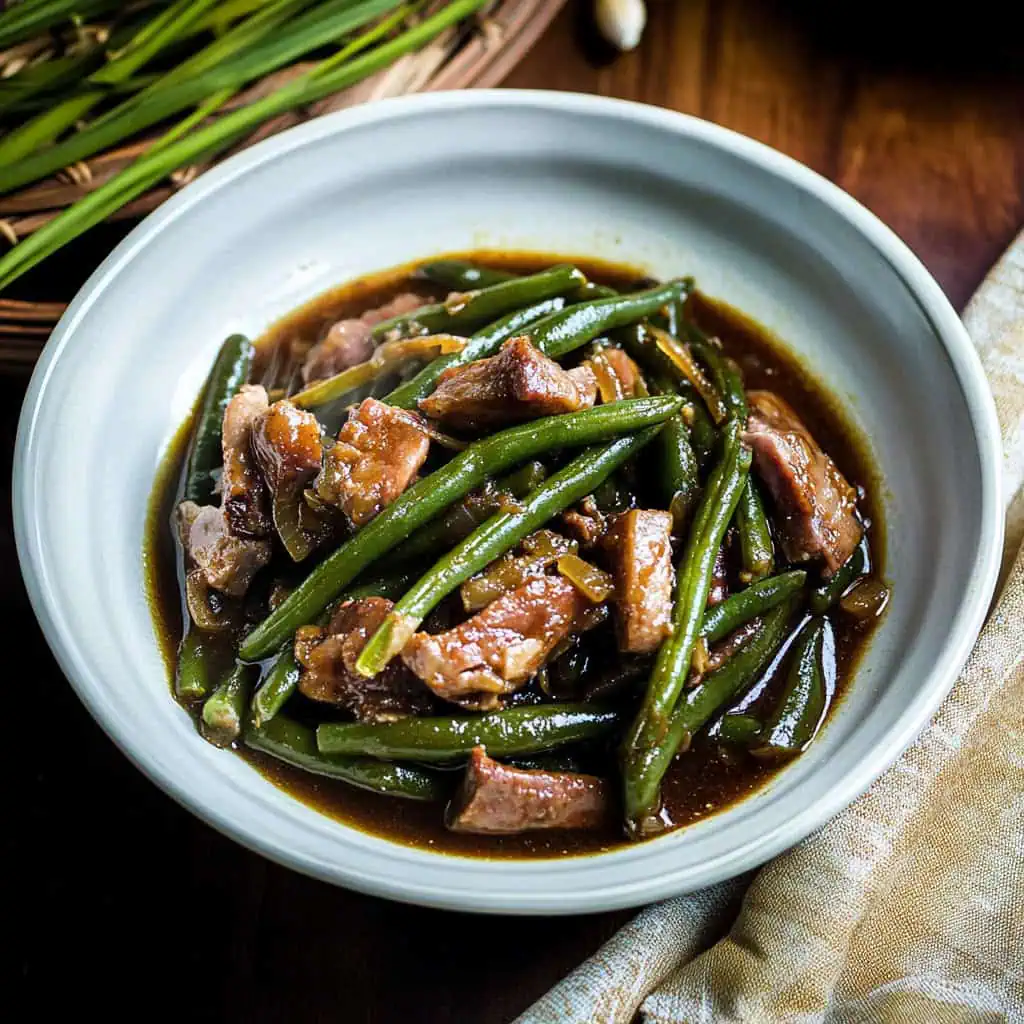

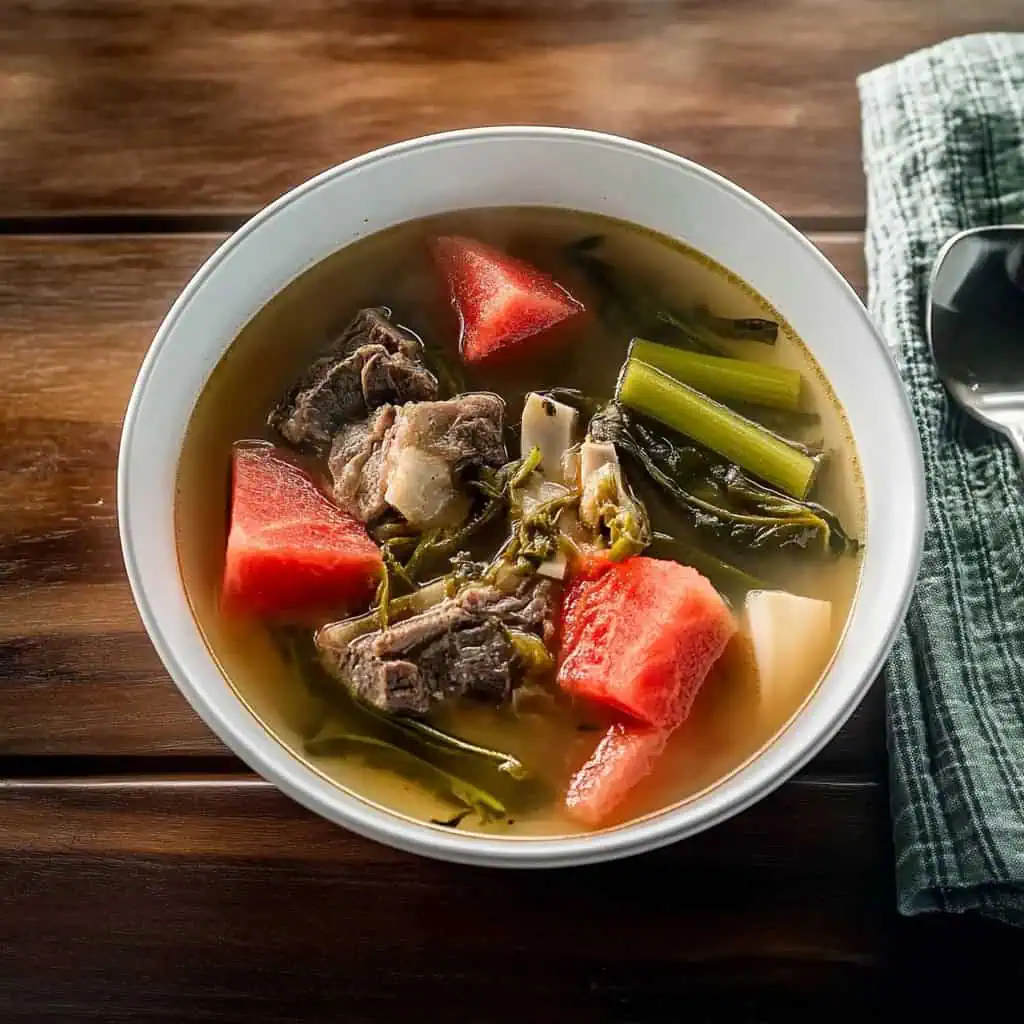
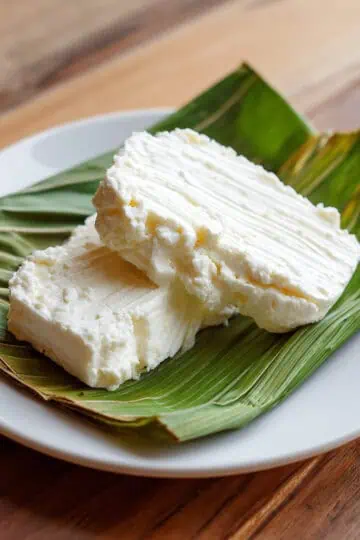
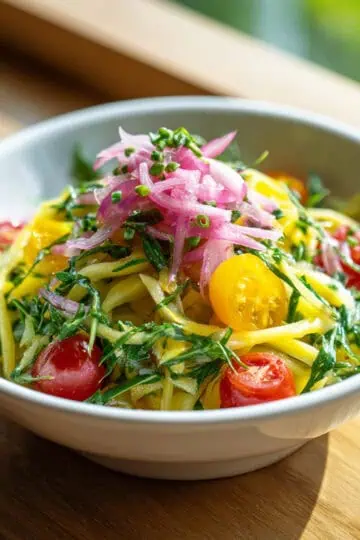
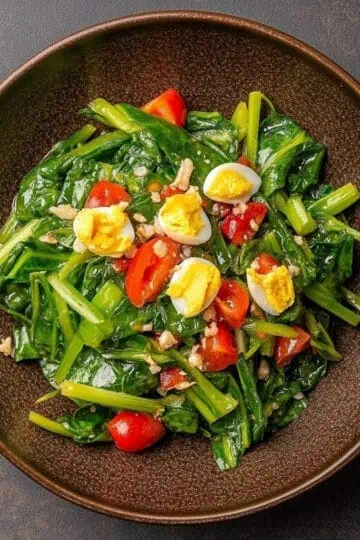
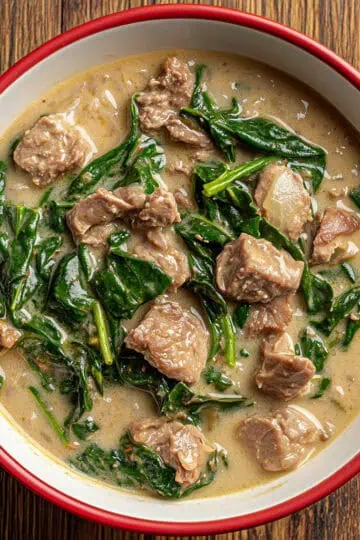
Comments
No Comments